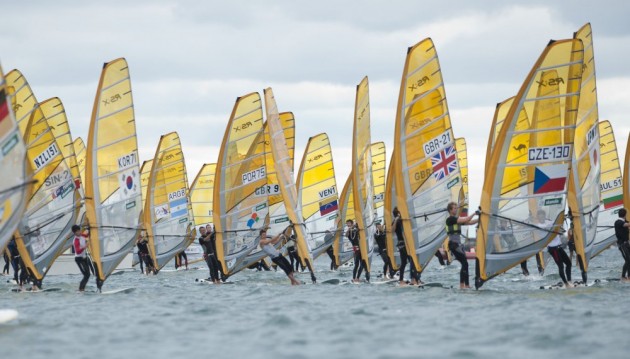Racing gets under way and delivers a fully mixed bag of weather
As the breeze whistled across the dinghy park this morning, 20 knots from the North felt as cold as early springtime and had many questioning whether a) this was really the best summer could deliver and b) whether the breeze really would drop off as forecast.
But as the fleet headed out towards their race courses the wind speed was on the decline and by the time they arrived it had dropped so much that many of the races were postponed. It was time to change gear mentally and rig tune wise and prepare for a long and at times frustrating day. In addition to the abandoned starts and fluky breezes, many of the fleets were sent ashore before being called back out to their race course areas less than an hour later, a round trip of over 10 miles for some.
Nevertheless, there were some like 470 word champions Matthew Belcher and Malcolm Page who read the tricky conditions perfectly and scored two bullets, an impressive performance on a day that saw other world champions buried in the fleet.
In the 470 women it was the British pair Hannah Mills and Saskia Clark who ended the day in the lead overall after posting a fourth and a first.
In the RSX boards it was a tough day of pumping with breezes rarely getting to 10 knots and frequently languishing at 6-8 knots. Julian Bontemps posted two impressive results with a second and a first to take the overall lead with Nick Dempsey currently sitting in third. In the womens’ class Zofia Noceti-Klepacka finised the day in first overall with Bryony Shaw in second.
Other familiar names at the front of the fleet included Thierry Schmitter in the 2.4mR class led the field with a second and a first with Megan Pascoe hot on his heels posting the same score in the opposite order.
For full details of results in each of the fleets go to Sail for Gold results
As a mark of how long the day had become, the Laser fleet were still not back at the dock at 8pm.
Tomorrow’s weather looks equally challenging in a week that looks like building to boisterous and could well deliver the full range of conditions over six days and justify Weymouth’s reputation as being one of the most variable and challenging weather venues in the world. A challenge in itself for those preparing for the Olympics in August.




